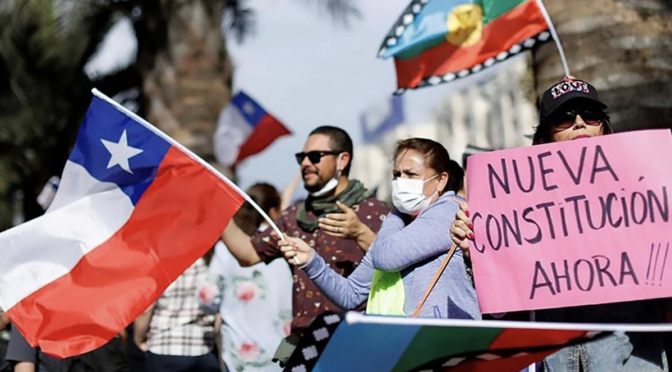By Matt Martin, PhD student in the UT Government Department
After three weeks under the Panamanian sun, I headed to Santiago for a taste of the Chilean winter. There I spent the last three weeks of the Democratic Institutional Development internship working closely alongside the team at the International IDEA office in Chile. The second half of my experience was a perfect complement to the first, providing not only greater exposure to IDEA’s operations but also a chance to understand more deeply Chile’s constitutional moment, a topic of great personal interest.
Most of my time was spent at the International IDEA office in the Edificio Moneda Bicentenario, which houses the offices of numerous ministries from the Chilean national government. Our neighbors included the General Secretariat of the Presidency, the General Secretariat of Government, the Ministry of the Interior and Public Security, and the Ministry of Social Development, among others. Though I worked mostly alongside IDEA program assistant Renata Retamal Iturriaga, the whole IDEA team, including Ricardo Mena and Ana María Campos, welcomed me and the other interns into the office with open arms.
I dedicated most of my time and energy in Chile to working on one constitutional project. To provide some background, the Delegation of the European Union to Chile and EU Member States have been working through the Foro Chile-Unión Europea (Chile-European Union Forum) to follow and learn from the Chilean constituent process over the last few years. International IDEA has actively supported this ongoing exchange by providing research support, which is where I came in.
As an intern, I contributed to a project that sought to gather laws, legislation, and media stories that have emerged since the start of the constituent process in relation to a key constitutional topic. My assigned topic was gender. Through extensive data collection, I worked to construct an image of the public agenda in Chile regarding the issue of gender since late 2019. These data are sure to prove useful for IDEA and their collaboration with the Chilean government, especially given how much attention the topic of gender has received in the country’s constitution-making process.
On top of the rewarding work, the IDEA team organized events that allowed me and my colleagues to learn more about the state of ordinary and constitutional politics in Chile. Before my arrival to Santiago, the other interns—Alejandra, Guillermo, and Tien—had the opportunity to observe a private conference organized by the Constitutional Council responsible for drafting Chile’s new constitution. They met and conversed with numerous Latin American constitutional scholars as well as key members of the drafting body, much to my envy. Moreover, a few weeks after my arrival, we all had the chance to meet with Dr. Fabricio Franco, a professor and director of the Chile office of the Latin American Faculty of Social Sciences. During our gainful exchange, Dr. Franco explained at length the particularities of the current moment in Chile, economically, politically, and socially speaking.

Outside of work, I tried to see as much of Santiago and the rest of Chile as I possibly could. One of the fellows, and a good friend of mine, Guillermo, is from Chile. He was kind enough to host our group at his family’s home in the town of Reñaca, not far from where he grew up in the city of Viña del Mar. We spent the weekend exploring Viña and the city of Valparaíso, trying seafood, walking on the coast, and taking in all of the picturesque views from the area’s rolling hills and colorful buildings.

As if that weren’t generous enough, Guillermo and his family allowed us to spend a weekend at their apartment in the town of Puerto Varas in southern Chile. The region was absolutely stunning with its history of German colonization and cultural influence as well as a wealth of natural beauty.
My highlight from this trip was visiting the Saltos de Petrohué (Petrohué Falls), a natural reserve dedicated to the waterfalls flowing from the surrounding mountains and dormant volcanoes. The water was a distinctly bright greenish blue color that was truly striking. Apart from these unforgettable weekend trips, I also enjoyed roaming through the streets of Santiago de Chile during my free time. After hours of walking aimlessly through the many parks and green spaces in my neighborhood of Providencia, I gained a deep appreciation for the city’s sheer beauty (and easy navigability).

My time in Chile has since ended. I am now reflecting on the many remarkable experiences I had there as well as in Panama. One thing is sure, however. The Democratic Institutional Development fellowship was a truly invaluable experience, on both a professional and personal level. I have forged important connections in the field of electoral and democratic assistance, and I also have formed meaningful friendships, especially among the other fellows, that I am sure will endure. I would like to thank the UT Government Department, International IDEA, and the Comparative Constitutions Project as well as everyone involved for making this program possible. I look forward to seeing what we can do to continue this venture in the years to come.
